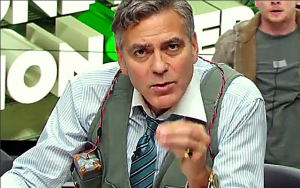Metro: Why George Clooney continues the push the limits of his movie stardom
By Richard Crouse – Metro In Focus
George Clooney is a rare breed, a one-name film star. Mention “George” and everyone knows who you’re talking about.
He’s headlined a handful of films dating all the way back to when there was a Clinton in the White House that raked in north of $100 million. Since leaving the television show ER in 1999, he’s released two movies a year on average, including this weekend’s Money Monster, a thriller about the host of a financial advice show held hostage on live TV by an investor who lost everything.
Some of his films have been successful, others not, but it’s clear Clooney doesn’t aspire to be a blockbuster star. Perhaps it’s because George is, as Time called him, “the last movie star,” that he appears determined to smash what that kind of stardom means. By lending his name to offbeat movies he deconstructs the mechanism of superstardom.
George steers his career toward character driven pieces, often at the expense of giant box office numbers. And while the fabric of his fame may fray around the edges from time to time — he’s as susceptible to box office vagaries as anyone — he stays busy, winning Oscars, producing movies like August: Osage County and acting as pitchman for everyone from Fiat to Martini vermouth.
“I’m very aware of the fact that if not for a Thursday night time slot on ER, I wouldn’t have this career,” he once said, “so I’m going to push the limits as much as I can.”
From kid flicks to period dramas and political satire Clooney has done just that.
Loosely based on a Roald Dahl story, the stop-motion animated Fantastic Mr. Fox sees Clooney as a smooth-talking fox that returns to a life of crime after buying a tree house he can’t afford. Clooney brings charm, wit and warmth to an unpredictable character, smooth one minute, a wild animal the next.
Clooney also starred in The Good German, a tribute to 1940s cinema shot with technology from the golden age of Hollywood — the same lenses, the same atmospheric lighting, the same rat-a-tat-tat style of dialogue, the same everything. It’s a retro-looking film made with twenty-first century creative freedom. Clooney, as an American military journalist covering the Potsdam Conference in post-war Berlin, and co-star Cate Blanchett look like golden age movie stars but behave more like Brat Packers.
Strangest of all is The Men Who Stare at Goats, the best movie with the worst name on Clooney’s resume. He plays a psychic soldier in this screwball satire about the state of modern warfare. Its an absurdist film, filled with memorable images — Clooney staring down a goat, enlisted men doing the Watusi and a montage of Jeff Bridges embarking on a journey of enlightenment — where no joke is too broad or too barbed.
George is so artistically eclectic he even disowns one of his biggest hits. “I always apologize for Batman!” he says of the ludicrous Batman & Robin.

